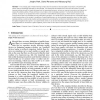Free Online Productivity Tools
i2Speak
i2Symbol
i2OCR
iTex2Img
iWeb2Print
iWeb2Shot
i2Type
iPdf2Split
iPdf2Merge
i2Bopomofo
i2Arabic
i2Style
i2Image
i2PDF
iLatex2Rtf
Sci2ools
107
click to vote
TLT
2010
2010
To Flow and Not to Freeze: Applying Flow Experience to Mobile Learning
— A key design goal of mobile learning is that its built-in experiences are enjoyable and proactive, empowering the learner with the knowledge and ability to self-manage. This implies that the benefits and critical success factors of mobile learning activities should not simply be based only on learning performance, but also on learners’ experiences so that we can assess the added qualities of these activities over and above rote knowledge acquisition. To empirically demonstrate this premise, we report on an assessment of flow experience in three different learning spaces, where learners explore a built environment as part of a simulated security guard training program. Our results seem to show that the true cost-benefit ratio of mobile learning may not be evident in measures of learning performance or rote knowledge acquisition alone, but that mobile learning activities could provide a better learning experience by providing the conditions for optimal flow experience. Further, in ...
Related Content
| Added | 31 Jan 2011 |
| Updated | 31 Jan 2011 |
| Type | Journal |
| Year | 2010 |
| Where | TLT |
| Authors | Jungho Park, David Parsons, Hokyoung Ryu |
Comments (0)

